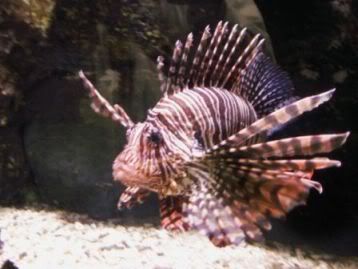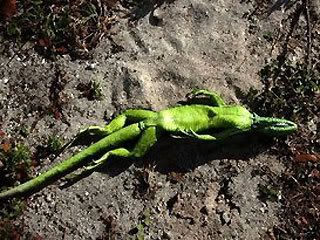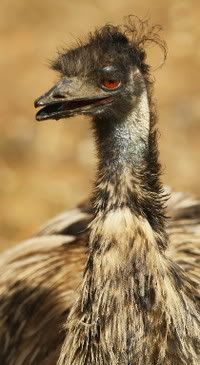Sounds like it's a dangerous predator, though only grows to 20 inches. From the article, it is said to be "A Bluto Blutarsky of the water kingdom, it will eat anything it can cram into its mouth -- sea horses, crustaceans and all manner of native fish -- and is a breeding machine. Also, it stings divers."

Picture courtesy of www.freenaturepictures.com
The non-native lionfish has caused ecological havoc everywhere it has spread. Now it has reached the Keys.
KEY LARGO -- Becky Fowler was shipwreck-diving 66 feet below the surface, exploring a watery paradise, when she came face to face with a four-inch-long, zebra-striped Cujo of the deep.
Yes, the dreaded lionfish has made its way to the Florida Keys. Fowler's discovery, confirmed a few days later by divers who captured and dissected the creature, has sent shivers through the Keys' fishing and tourism industries.
Just as pythons have disturbed the natural ecosystem of the Everglades, the lionfish could someday become a scourge of the Keys. A Bluto Blutarsky of the water kingdom, it will eat anything it can cram into its mouth -- sea horses, crustaceans and all manner of native fish -- and is a breeding machine.
Also, it stings divers, painfully.
'We knew this `perfect predator' was coming,'' said Lisa Mitchell, executive director of the Key Largo-based Reef Environmental Education Foundation (REEF), which responded to Fowler's discovery. ``We just didn't know when.''
Florida is also becoming home to other non-native species,
some more annoying than others.Iguana population growing.
"We have found dozens on the bike path after a major cold snap," said park manager Robert Yero. "When they warm up in the sun, they come back to life."
At least three iguanas in suspended animation could be found under trees in the park, which lies on the southern tip of Key Biscayne, a barrier island just south of Miami Beach and across Biscayne Bay from the city of Miami. Yero had little sympathy for the frozen iguanas, explaining that they were an invasive species devastating to native plant life.
"They really are taking over," he lamented.
 A remarkable cold snap that brought temperatures in the mid-30s to the Miami area Thursday morning also brought lizards falling out of trees at Bill Baggs Cape Florida State Park on Key Biscayne, the Miami Herald reported.
A remarkable cold snap that brought temperatures in the mid-30s to the Miami area Thursday morning also brought lizards falling out of trees at Bill Baggs Cape Florida State Park on Key Biscayne, the Miami Herald reported.And emus are not native here either. One escaped from its owner. They had to taser it.
Fla., turned to high-tech to bring down a runaway pet emu, the Panama City News Herald reports Thursday. They Tasered the bird. Twice.
Deputies and animal control officers had been searching for the bird for several days after getting reports that it was chasing cars. Then they finally cornered the emu, named Plop-Plop, in a goat pen, the newspaper says.
But each time Bay County Sheriff Deputy Randolph Grob moved closer, Plop-Plop became highly agitated. "The thing went crazy," Grob tells the newspaper.
Wary of Plop-Plop's sharp talons and long legs, but unwilling to use a regular gun to subdue her, Grob says the officers zapped Plop-Plop with a Taser. When she still tried to make a run for it, they hit her again, the newspaper says.
 Deputies subdue runaway emu
Deputies subdue runaway emuMore from the article on the lionfish. I never knew they could do so much harm. A University study, "the first to quantify the severity of the situation, research teams observed one lionfish gorging on 20 small fish in less than 30 minutes."